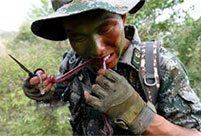

KUNMING, July 23 -- The war between humans and elephants rages in southwest China's Yunnan Province.
This year alone, three people have been killed by wild elephants there, and three elephants are known to have been killed by either pesticides or gunshot.
A villager from Xishuangbanna Dai Autonomous Prefecture, a popular tourist destination where elephants feature prominently on any itinerary, was detained by police on Sunday for killing a pregnant wild elephant. Named by police as Wang, the villager opened fire with a homemade gun on a group of wild elephants that had invaded his land. A female elephant weighing more than 3 tonnes was later found dead in Wang's fish pond with a bullet in her head. The cow was carrying a 99-kilogram male calf and was almost ready to give birth.
On June 26, two immature bull elephants were found dead with blood oozing from their mouth, trunk and anus. Police found pesticides in the stomaches of both and have not ruled out the possibility that they were poisoned by farmers. As many as 16 wild elephants were seen in the area at the end of November and various incidents have since been reported.
Asian elephants are an endangered species and protected in China. About 250 to 300 roam Xishuangbanna and other parts of south Yunnan. Fragmented habitat means they often intrude into villages, damage crops and even attack humans.
FOOTPRINTS IN THE BUTTER
A villager died after being attacked while working in his fields in June. His wife narrowly escaped death thanks to a shed that collapsed, shielding her from further attacks. There have been at least three elephant attacks in the vicinity this year. Two women died from such attacks in the area in 2012 and 2013.
Heavily forested Simao District is an ideal habitat for elephants. About 60 of them are known to roam the district. Six people have died there and nine have been injured in elephant attacks since 1999. Farmers are afraid to harvest their crops. Students have nerve-racking trips to school and local people go less frequently to the market. Some cannot even sleep in their own houses for fear that hungry pachyderms will break in and raid their larders.
The number of wild elephants is on the rise, which is certainly a good thing, but they pillage or trample crops, tear down trees and houses and are a very real threat to people's lives.
Simao forestry bureau attributed 33 deaths and 165 injuries to wild animals, mostly elephants, from 1991 to 2010. In the whole province, 1,324 deaths and about 390 million yuan (63.7 million U.S. dollars) of losses have been blamed on wild animals over the past decade. Such tragedies will become more frequent if the central government campaign to improve the environment is successful and elephant numbers increase.
PACHYDERM PICNICS AND PREMIUMS
An adult elephant eats up to 300 kilograms of food each day and drinks a large amount of water. It walks dozens of kilometers while foraging.
Chen Mingyong, an elephant expert with Yunnan University, believes that conservation corridors are key to resolving the conflict between man and beast. Linking the fragmented habitat with protected corridors will reduce the overlapping space inhabited by both humans and elephants.
Food source bases where bamboo and bananas are grown specifically for the elephants will also help. Most of the harm done comes from the elephants' endless search for food.
Simao government spent over 600,000 yuan last year on an "elephant canteen" that includes a banana garden, a bamboo forest and a pool. The provincial government faces mounting compensation bills for damage caused by the protected animals. The annual cost can run to 10 million yuan.
In 2009, Yunnan contracted China Pacific Insurance Co. to insure crops, property and lives in some regions. The government pays the premiums and the insurers investigate and compensate people when animals cause trouble.
Li Laoxiao has tried everything to drive the elephants away from his plantation, but to very little avail. "Now I just let them eat. I get 15 yuan for each damaged rubber tree, and 10 yuan for a banana tree."
The commercial mechanism is clearly more effective. Compensation is higher and paid more quickly, but rumbling discontent persists. In November, 114 villagers from nine villages in Simao petitioned for better protection and higher compensation.
Yang Zhengrong of the insurers' Yunnan branch told Xinhua that the company paid over 81 million yuan in compensation from 2010 to 2013 but received less than 48 million yuan in premiums.
"The compensation mechanism needs to be improved. It is not sustainable in the long run," Yang said.
 China-made special vehicles in exhibition
China-made special vehicles in exhibition Soldiers serving at Liaoning aircraft carrier
Soldiers serving at Liaoning aircraft carrier Bikini beauties lifeguards in river rafting place
Bikini beauties lifeguards in river rafting place PLA soldiers eat raw snake meat in harsh training
PLA soldiers eat raw snake meat in harsh training Kiss contest held in Nanning, SW China
Kiss contest held in Nanning, SW China Yunnan-Myanmar Road: The past and present
Yunnan-Myanmar Road: The past and present Photos of beautiful policewoman become online hit
Photos of beautiful policewoman become online hit Campus belle of Xiamen University gets popular online
Campus belle of Xiamen University gets popular online Eight fruits that defend men's health
Eight fruits that defend men's health  Did the "Spartan" publicity stunt cross the line?
Did the "Spartan" publicity stunt cross the line? Sydney police that let mob attack consulate failed to do their duty
Sydney police that let mob attack consulate failed to do their duty 'Model fisherman' reel in tourist yuan in Guilin
'Model fisherman' reel in tourist yuan in Guilin Shady Chinese contraceptives also found exported abroad
Shady Chinese contraceptives also found exported abroadDay|Week